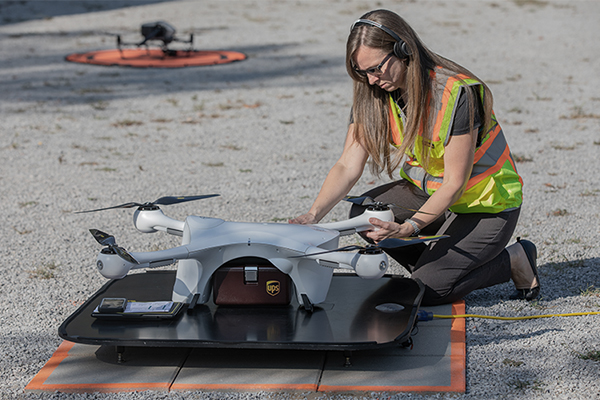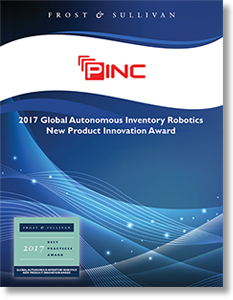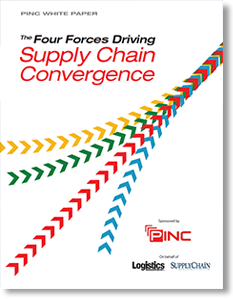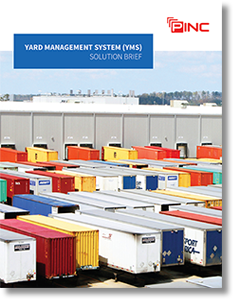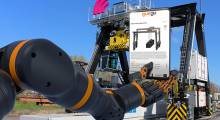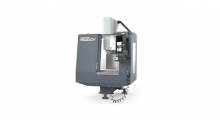UPS Flight Forward Inc.
UPS (NYSE:UPS) subsidiary UPS Flight Forward Inc. yesterday announced it has received the U.S. government’s first full Part 135 Standard certification to operate a drone airline.
The company will initially expand its drone delivery service further to support hospital campuses around the country and to provide solutions for customers beyond those in the healthcare industry.
UPS Flight Forward plans in the future to transport a variety of items for customers in many industries, and regularly fly drones beyond the operators’ visual line of sight.
The U.S. Federal Aviation Administration (FAA) awarded UPS Flight Forward a Part 135 Standard certification on Friday. The UPS subsidiary immediately launched the first drone delivery flight by any company under Part 135 Standard at WakeMed’s hospital campus in Raleigh, N.C. That flight, using a Matternet M2 quadcopter, was flown under a government exemption allowing for a “beyond visual line of sight” (BVLOS) operation, also a first in the U.S. for regular revenue-generating delivery.
Read: UPS Partners with Matternet to Transport Medical Samples via Drone across Hospital System
UPS has proven the need for drone delivery in healthcare operations, where the shortest time in transit can improve efficiency and help healthcare professionals serve their patients better. Earlier this year, UPS partnered with drone-maker Matternet to launch its healthcare delivery service on the WakeMed campus. This first-ever revenue-generating service demonstrated the business case for drone delivery of medical products and specimens. With its Part 135 Standard certification, UPS is ready to build on this application and expand to a variety of critical-care or lifesaving applications.
“This is history in the making, and we aren’t done yet,” said David Abney, UPS chief executive officer.
“Our technology is opening doors for UPS and solving problems in unique ways for our customers. We will soon announce other steps to build out our infrastructure, expand services for healthcare customers and put drones to new uses in the future.”
Read David Abney's Article: For UPS and Drones, Blue Skies Ahead
The FAA’s Part 135 Standard certification has no limits on the size or scope of operations. It is the highest level of certification, one that no other company has attained. UPS Flight Forward’s certificate permits the company to fly an unlimited number of drones with an unlimited number of remote operators in command. This enables UPS to scale its operations to meet customer demand. Part 135 Standard also permits the drone and cargo to exceed 55 pounds and fly at night, previous restrictions governing earlier UPS flights.
“UPS Flight Forward is benefitting from our knowledge as one of the world’s leading airlines. The Flight Forward organization is building a full-scale drone operation based on the rigorous reliability, safety, and control requirements of the FAA,” Abney said.
“This is a big step forward in safely integrating unmanned aircraft systems into our airspace, expanding access to healthcare in North Carolina and building on the success of the national UAS Integration Pilot Program to maintain American leadership in unmanned aviation,” said U.S. Secretary of Transportation Elaine L. Chao.
UPS has established itself as a leader in unmanned aerial vehicle delivery, having tested drones for urgent commercial deliveries over water; funded and supported humanitarian deliveries in Africa; tested non-urgent commercial residential delivery in rural areas with drones launched from a UPS package delivery car.
UPS also has provided input to government regulators responsible for establishing rules for safe drone operations in the United States. A UPS senior executive has served since 2017 as one of a select group of corporate advisors on the FAA’s drone advisory committee.
On The Horizon for UPS Flight Forward
UPS Flight Forward is forging paths to create innovative new services for customers. Part 135 Standard certification enables UPS to integrate drones into the UPS logistics network, creating the potential for new applications in many industries. The company has a long-term plan with important milestones in view. These include:
- Expansion of the UPS Flight Forward delivery service to new hospitals and medical campuses around the country
- Rapid build-out of ground-based, detect-and-avoid (DAA) technologies to verify drone safety, while enabling future service expansion
- Construction of a centralized operations control center
- Regular and frequent drone flights beyond the operator’s visual line of sight
- Partnerships with additional drone manufacturers to build new drones with varying cargo capacities
- Adding new services outside of the healthcare industry, including the transport of special commodities and other regulated goods
* A Part 135 Standard operator is a certificate holder that does not have pre-set limits on the available size or scope of their operations. There are four different scopes of operations for Part 135 certificate holders, as outlined by the FAA: 135 Single Pilot; 135 Single Pilot in Command; Basic; and Standard.
Related Article: Are Drones A Sky-High Vision For The Future of Logistics?
Related Resources
Using Autonomous Robots to Drive Supply Chain Innovation
This paper details how new technologies are presenting promising opportunities for improvement across the supply chain and how autonomous robots and drones are poised to change the game. Download Now!
Global Autonomous Inventory Robotics New Product Innovation Award
This best practices research paper details the PINC Air inventory robotics solution with its quick deployment model, faster inventory velocity, product ingenuity, and rapid ROI underscoring the decision for PINC to win Frost & Sullivan’s 2017 New Product Innovation Award. Download Now!
The Four Forces Driving Supply Chain Innovation
When supply chain professionals discuss supply chain execution, their focus is typically put on transportation management systems and warehouse management systems, the yard management systems capability and importance are mistakenly undervalued. Download Now!
The Rise of the Digital Yard
In this white paper, we explore the rise of the digital yard and show how technology is enabling significant efficiencies, productivity gains, and cost containment in a world where every penny added to the bottom line positively impacts organizational success. Download Now!
Solution Brief: Yard Management System
Yards are the intersection between warehouses and transportation, they are a critical linkage in logistics management practices and have a significant impact on the overall efficiency of the supply chain. Download Now!
More Resources on Drones
Article topics
Email Sign Up

